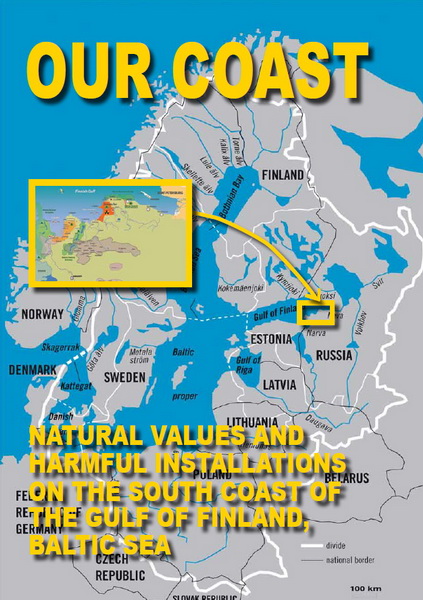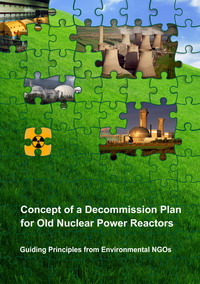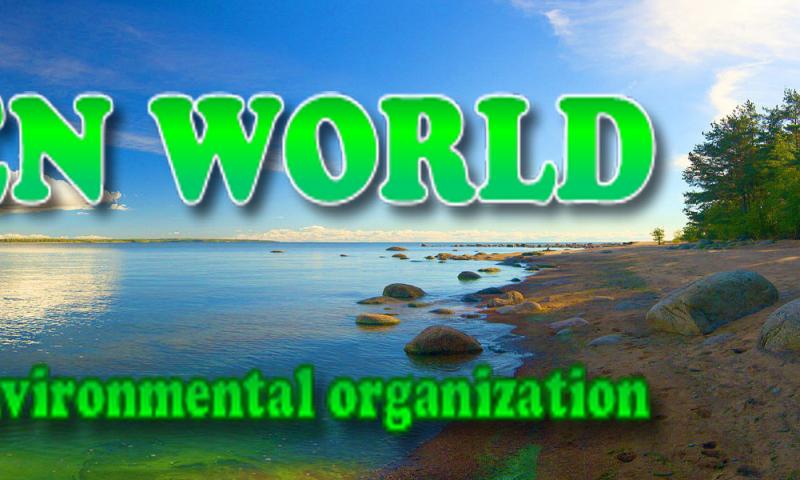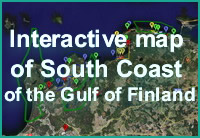
 |
The South Coast of the Gulf of Finland |
|---|---|
| Natural Values and Harmful Installations |
 |
Concept of a decommission plan for old nuclear power reactors |
|---|---|
| Guiding Principles from Environmental NGOs |
Decommissioning of the Ignalina nuclear power plant (Lithuania). Working on errors.
Green World Baltic News
It has been 10 years since the decision to decommission the Ignalina Nuclear Power Plant (INPP). Two of the most powerful, but not the oldest, of the energy blocs of the Chernobyl series (RBMK-1500) total capacity 3.000 MW were stopped in the last days of 2004 and in 2009, and became the first to have taken the path of decommissioning.
 With the support of European Union, Lithuania had planned to complete by 2030 the program of decommissioning. Moreover the INPP was to remain a “dry storage” of spent nuclear fuel and radioactive waste. For more details, please see conception_eng_1610.pdf. The project (for 2 energy blocks) was estimated to cost 1 billion euros when it was designed. The necessary amount was expected to be covered by the EU (90%) and Lithuania (10%).
With the support of European Union, Lithuania had planned to complete by 2030 the program of decommissioning. Moreover the INPP was to remain a “dry storage” of spent nuclear fuel and radioactive waste. For more details, please see conception_eng_1610.pdf. The project (for 2 energy blocks) was estimated to cost 1 billion euros when it was designed. The necessary amount was expected to be covered by the EU (90%) and Lithuania (10%).
Ten years later, 1 billion euros has already been spent and the cost of the decommissioning of one power unit is currently being assessed at 2.9 billion euros.
A number of conflicts have arisen among the participants of the project, as well as with donors. The project is behind schedule, while at the same time the public does not have full information about its implementation.
An accident (on 4 October 2010) with a spill of several hundred tons of radioactive water from the primary circuit of one of the shut-down reactors confirmed that the project does not meet current safety criteria.
 The international conference „Nuclear decommissioning issues: European and Lithuanian experience“ was organized September 12, 2011 in Vilnius by representatives of the concerned NGOs of Lithuania, Belarus, and Russia. Its purpose was to discuss the progress of the project of decommissioning the INPP and suggest possible mechanisms to solve the current crisis.
The international conference „Nuclear decommissioning issues: European and Lithuanian experience“ was organized September 12, 2011 in Vilnius by representatives of the concerned NGOs of Lithuania, Belarus, and Russia. Its purpose was to discuss the progress of the project of decommissioning the INPP and suggest possible mechanisms to solve the current crisis.
Participants in the discussion were representatives of Lithuanian authorities, of the operator of the INPP, and of the national regulatory agency of nuclear safety, political parties and NGOs of Lithuania, Belarus, as well as a representative of the international network of NGOs “Decommission” and journalists.

During the discussion, the following issues were identified:
- Closed information about the course of decommissioning and a lack of transparency of decision-making on the financing of the individual components of the project. This creates conditions for corruption.
- The absence of a systematic approach to a whole range of problems of decommissioning. This leads to unbalanced decisions, and misuse of funds.
- A monopolistic approach of the national authorities of Lithuania to the allocation of funds for the decommissioning, lack of discussion with all interested stakeholders (government at all levels, political parties, the NPP administration, and the public) has led to a source of conflict in society, led to inefficient use of resources.
- Incompetent interference of politicians in solving technological problems of the decommissioning of the NPP.
Replacement of a third of the technical managers of the INPP with diplomats and politicians who do not have the appropriate basic education, but receive a higher salaries, has become a source of conflict within the NPP, which undermines the security of the decommissioning of the INPP.
Oleg Bodrov, representative of “Decommission,” an international network of NGOs presented a report (PowerPoint presentation of Bodrov) of positive international experience of decommissioning nuclear power plants based on examples of Germany, the United States, and Sweden. The conference participants received DVDs with video documentaries, telling about this experience. (интернет-ссылка на список для скачивания фильмов с англоязычными субтитрами)
 During the discussion, the participants outlined possible steps to overcome the crisis of the decommissioning process of the Ignalina NPP.
During the discussion, the participants outlined possible steps to overcome the crisis of the decommissioning process of the Ignalina NPP.
The first step should be a decision at the national level of Lithuania, which would provide access to all stakeholders of the decommissioning process to information related to the status of the nuclear power plant and the progress of the decommissioning project.
The second step should be the creation of a Public Council for monitoring the decommissioning of the nuclear power plant, in which the following stakeholders should be invited to work: government officials of various levels, political parties represented in Lithuanian parliament, the representatives of Donors (EBRD), the employee collective of the INPP, and concern NGOs.
The experience with projects of decommissioning of the nuclear power plants of Maine Yankee (U.S.) and Nord (Germany) have showed high levels of efficiency of such a mechanism as a Public Council, assuming transparency of information. Such a Council, on the one hand, serves as a platform for interaction between all interested stakeholders of the decommissioning process, and on the other hand, provides a transparency of the process to the public.
It is advisable to invite to Lithuania Raymond Shadis, one of the leaders of the American social movement who has Lithuanian roots, and who played a key role in ensuring the effective work of the Public Council during the decommissioning process of the Maine Yankee Nuclear Power Plant. Such expert support could serve as a momentum to overcome the crisis concerning the decommissioning of Ignalina NPP.
The work of the Conference was widely publicized in the media.
In Russian
http://www.newkaliningrad.ru/forum/blog/383/entry-3230-v-vilnjuse-proidet-seminar-po-problemam-zakrit/
http://www.39.ru/neibsnews/3908-2011-09-08-17-02-02.html
In Russian http://rugrad.eu/communication/blogs/Maikl_Kostayev/4689/
http://www.atomine.lt/naujienos/3-naujienos/28-2011-09-09-08-03-30
In Lithuanian
http://www.žali.lt/node/64
http://www.atomine.lt/component/content/article/3-naujienos/30-vilniuje-rengiamas-seminaras-ignalinos-ae-uzdarymo-klausimais
http://ekologija.blogas.lt/vilniuje-vyks-tarptautinis-seminaras-ignalinos-ae-uzdarymo-klausimais-15964.html
http://www.lvls.lt/lt/index.php?option=com_content&view=article&id=787:vilniuje-rengiamas-seminaras-ignalinos-ae-udarymo-klausimais&catid=5:tituliniam&Itemid=38
Video (Baltic Channel One News) 12 September
In Russian
http://youtube.com/watch?v=st1wYeYkC2A&feature=player_embedded
Interviews:
In English
http://greenworld.org.ru/?q=ang_decom_71011_int
http://www.lrytas.lt/-13155526241314074703-rusijos-ekologas-s-bodrovas-astravo-nemano-visagino-trikampyje-vyksta-%C5%A1altasis-atominis-karas.htm
http://visaginietis.lt/naujienos_/naujienos/rusijos-ekologas-o.bodrovas-astravo-nemano-visagino-trikampyje-vyksta-saltasis-atominis-karas/
http://www.atomine.lt/apie-ae-gresmes/29-rusijos-ekologas-olegas-bodrovas-astravo-nemano-visagino-trikampyje-vyksta-saltasis-atominis-karas
Articles
In Russian
http://belarus.regnum.ru/news/1444570.html
In Lithuanian
http://www.15min.lt/naujiena/aktualu/lietuva/zaliuju-atstovas-viena-is-problemu-uzdarant-iae-zmonems-nesakoma-tiesa-56-169407
http://www.alfa.lt/straipsnis/12422669/Ignalinos.atomines.avarija..kas.is.tiesu.ivyko.2010.metais.=2011-09-14_09-21/
Photographs
http://www.flickr.com/photos/67543111@N08/sets/72157627661577520/
Presentations of conference participants
http://www.atomine.lt/


